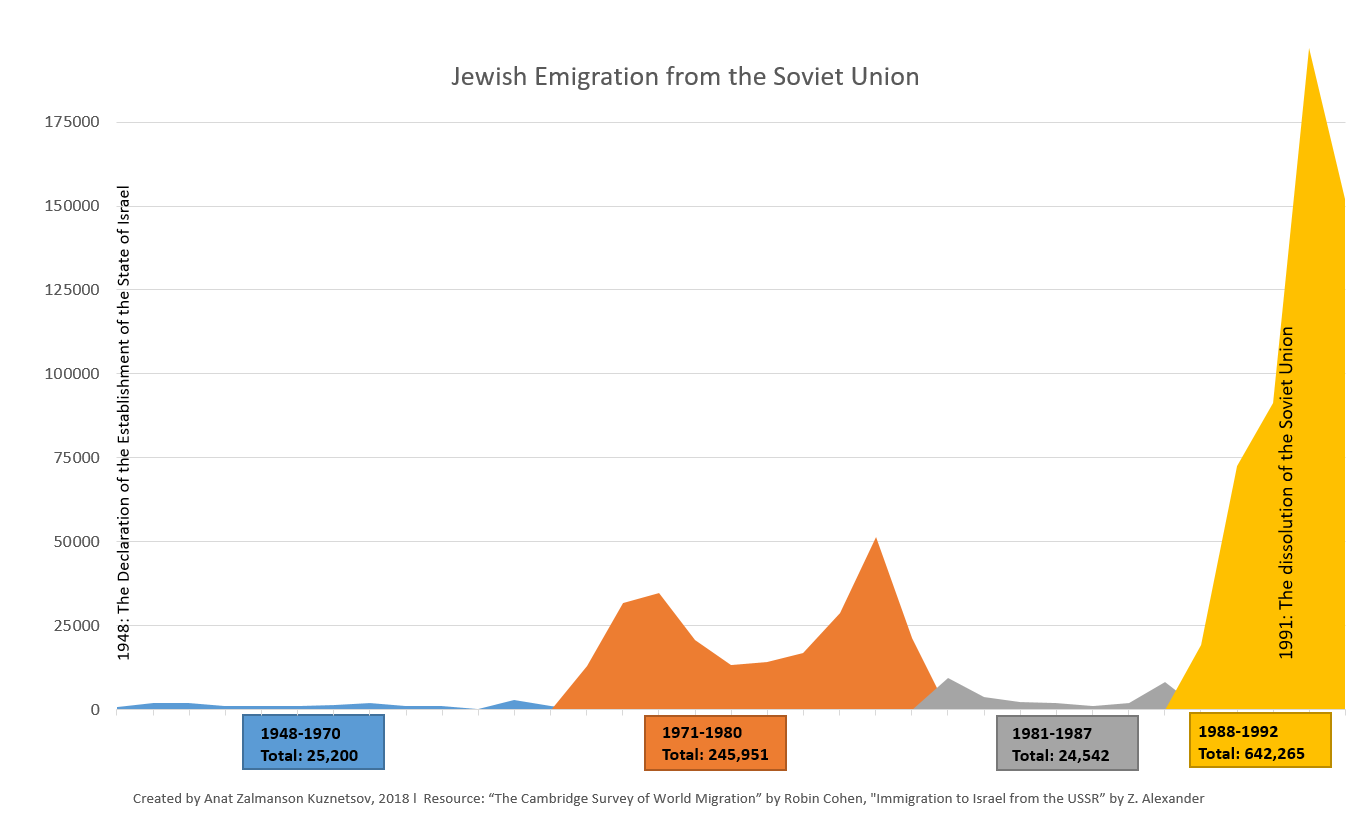Introduction
The Soviet government stated that they let Jews out without any problem, though the statistics make clear that this was a lie. In the year 1968, only 379 Jews were issued visas to leave the USSR. But how many Jews were in the USSR at that time? How many asked for an exit permit and received a refusal? And how many were afraid to ask?
In this lesson, students will consider the lies of the Soviet government and the emigration difficulties that Jews faced.
PROCEDURE
- Read the background information below as a class.
- Then, review the source materials provided below. Students should use these sources to consider the lies that the Soviet government was telling about Jewish emigration from the USSR.
- Then, introduce the calculation activity, allowing each group time to brainstorm and then share their ideas with the rest of the class.
Background Information
The Soviet Union was one of the two main superpowers in the world until its downfall in 1991. The Soviet Union had 3 million Jewish citizens, though it prohibited the observation of religion. Many Jews aimed to leave for Israel, but the Soviet regime would not allow them to leave the country. The departure of the Jews was considered a failure of the Soviet Union’s propaganda that their country was a paradise on earth. Therefore, any expression of Judaism, Zionism, sympathy for Israel, or the desire to immigrate to Israel was considered treason. Many were arrested without actual crime, and sent to prison for espionage, or refused work.
Primary Sources - Quotations
This unequivocal statement was published in the USSR newspapers as an indirect call for Jews who want to unite with their families in Israel to do so:
“Individuals raise the question of the departure of Jews. Some even say that anti-Semitism is supposed to exist in the USSR. There is no such thing in our country … and as for reuniting families who want to meet with their relatives or leave the USSR, the road is open to them and there is no problem in this.“
In the internal and external Soviet press, the policy of leaving the Soviet Union was expressed. Journalist Vladimir Katin wrote in an article published in the New York Times (April 17, 1971):
“The few citizens, the Jewish people who want to leave the Soviet Union for Israel … are allowed to do so, but the number of those who want to leave their Soviet homeland is very small.”
In Izvestia (February 20, 1971) the policy was explained in a positive and promising way:
“Soviet citizens seeking to unite with their relatives in Israel apply for immigration to Israel. Soviet government institutions carefully consider each case and do not prevent the citizens of the Jewish people from emigrating from the Soviet Union to permanent residence in Israel.”

Calculation Activity
What was the diploma tax?
In August 1972, the Soviet Union imposed a “diploma tax” on those with academic degrees who had studied at the state’s expense and sought to emigrate from it. The average salary in the 1970s for someone with a degree in engineering was 120 rubles a month, with average living expenses at 120 rubles per month.
The installation detailed the price list for degree holders seeking to leave the country:
- Graduates of the Institute of Humanities and Social Sciences: 4,500 rubles
- Graduates of the Institute of Agriculture and Forestry: 5,600 rubles
- Graduates of language schools: 6,800 rubles
- Graduates of technological institutes: 7,700 rubles
- Graduates of medical schools: 8,300 rubles
- Graduates of art and music institutes: 9,600 rubles
- Graduates of major universities such as Moscow: 12,000 rubles
- Graduates of universities in the periphery: 6,000 rubles
Ph.D. holders were required to pay another 1,700 rubles per school year.
Activity
Imagine that you are a Jew trying to leave the USSR in the 1970s. Based on your job position, you can earn 140 rubles a month, at best. Your basic expenses, without having children, are about 100 rubles a month. You are forbidden by law to receive funds from a foreign source.
Q: How many months will it take you to save to pay a “diploma tax” of about 8000 rubles? What would your best plan of action be to gather enough funds to even attempt to leave the USSR? What other alternatives would you consider?
Brainstorm in groups and then share your answers.